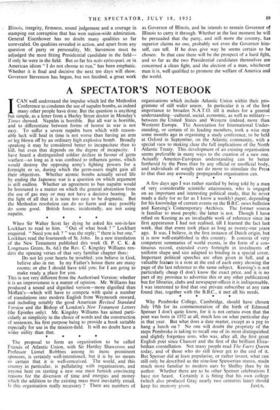A SPECTATOR'S NOTEBOOK
ICAN well understand the impulse which led the Methodist Conference to condemn the use of napalm bombs, as indeed many other people have done. But the question is anything but simple, as a letter from a Harley Street doctor in Monday's Times showed. Napalm is horrible. But all war is horrible, and to differentiate between forms of horror in war is not easy. To suffer a severe napalm burn which with reason- able luck will heal in time is not worse than having an arm or' leg blown off by an ordinary high explosive bomb. Broadly speaking it may be considered better to incapacitate than to kill, but even that depends on the degree of incapacity. I have heard a distinguished soldier declare in favour of germ warfare—so long as it was confined to influenza germs, which would destroy the opposing army's fighting powers for a fortnight or so, during which the germ-users might gain all their objectives. Whether atomic bombs actually saved life by ending the Japanese war is a question on which argument is still endless. Whether an agreement to ban napalm would be honoured is a matter on which the general abstention from the use of gas may or may not have a decisive bearing. In the light of all that it is none too easy to be dogmatic. But the Methodist resolution can do no harm and may possibly do some good. British forces, incidentally, are not using napalm.


































 Previous page
Previous page